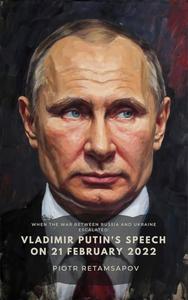
Free Download When the war between Russia and Ukraine escalated: Vladimir Putin's speech on 21 February 2022: A rhetorical and political analysis with regard to Russia's historical policy
by Piotr Retamsapov
English | March 16, 2024 | ASIN: B0CW9KWS55 | 74 pages | PNG (.rar) | 11 Mb
"Putin demonstrates Russian great power ambitions""One false claim after another".i In the days following 21 February 2022, numerous media reports with titles like these were published, dealing with Vladimir Putin's speech to the nation, which was dated 21 February 2022. Even today, more than a year later, media reports such as these on Putin's speeches in relation to the war in Ukraine are not diminishing. ii
A certain pattern seems to run through Vladimir Putin's speeches.v In general, political speeches have always been highly regarded in the discourse, as they can have an enormous impact on the audience.[v] This is also reflected in the good source situation, according to which numerous publications deal with the impact of political speeches.[vi] While this can be positive, as in Martin Luther King's famous "I have a dream" speech, this does not always have to be the case.[vii] Accordingly, a political speech can also be based on a manipulative intention. [viii]
The latter is also attributed to Vladimir Putin's speech to the nation on 21 February 2022. x
Due to the enormous influence of political speeches on the audience, it is worth analysing them in more detail.[x] Such a political speech analysis will be carried out below using the example of Vladimir Putin's speech to the nation on 21 February 2022. The sources for this are considerable due to the topicality of the Ukraine conflict. [xi]
However, the choice of source must be precise.[xii] Depending on whether the author's text has a pro-Russian or pro-Western orientation, it will contain very different statements. [xiii]
The following section will analyse Vladimir Putin's speech to the nation on 21 February 2022. In the end, the aim is to find out how this speech relates to Russia's historical policy. In order to establish the context, the reader will be given the opportunity to read the entire speech in full. The basic functions that a political speech fulfils will then be worked out. The next step is to lay the foundations for analysing the speech by first explaining the initial situation and the content of the speech. The resulting analysis of the speech is based on the aspects of the arguments used by Putin, language, speech technique, facial expressions and gestures as well as the intention and is the subject of the fifth chapter. Based on the speech analysis, references are made to Russia's historical policy. The result of this reference is finally rounded off with regard to the question of how the references are to be evaluated.
